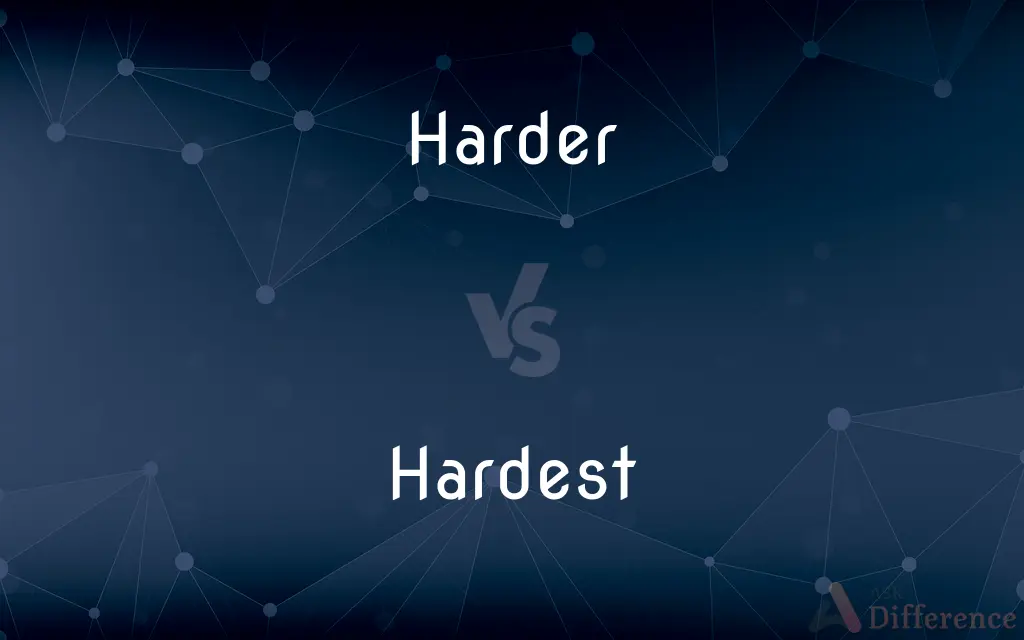Harder vs. Hardest — What's the Difference?
By Fiza Rafique & Maham Liaqat — Updated on May 7, 2024
"Harder" is the comparative form of "hard," used for comparing two things, while "hardest" is the superlative form, used to describe the extreme quality among three or more.

Difference Between Harder and Hardest
Table of Contents
ADVERTISEMENT
Key Differences
"Harder" is the comparative adjective form of "hard," which is used to indicate that one object or situation requires more effort or is more difficult than another. For example, running on sand is harder than running on a paved road. On the other hand, "hardest" is the superlative form of the same adjective. It is used when comparing three or more things, indicating that one is the most difficult or requires the most effort. For instance, among swimming, cycling, and running, swimming might be the hardest for someone with little experience in water sports.
When assessing the difficulty of tasks, "harder" directly compares two elements, suggesting that one has a greater level of challenge than the other. In contrast, "hardest" is used to single out one element as having the highest level of difficulty in a group. For example, in a series of exams, the mathematics test might be the hardest.
In educational settings, teachers might use "harder" to motivate students by pointing out areas that could use more attention or improvement compared to others, such as suggesting that adding fractions is harder than adding whole numbers. Whereas "hardest" might be used to describe the most challenging topic in the entire curriculum, like calculus being the hardest subject for many high school students.
In literature, "harder" and "hardest" serve to enhance the narrative by setting levels of struggle or challenge characters face. For instance, a character might find it harder to trust people after a betrayal, while the hardest thing they have ever had to do could be forgiving the betrayer.
In the workplace, these terms help in evaluating task difficulty or in performance reviews. A manager might say that adapting to new software is harder than learning an established system, while mastering a particular programming language could be the hardest part of an IT job.
ADVERTISEMENT
Comparison Chart
Form
Comparative adjective
Superlative adjective
Usage Context
Comparing two items
Comparing three or more items
Degree of Difficulty
Indicates a higher difficulty than another but not the highest
Indicates the highest degree of difficulty in a group
Example Usage
"This puzzle is harder than that one."
"This is the hardest puzzle in the set."
Typical Application
Used in direct comparisons between two elements
Used to highlight the most extreme among multiple elements
Compare with Definitions
Harder
More difficult or requiring more effort.
Solving algebra problems is harder than basic arithmetic.
Hardest
Most difficult or requiring the maximum effort.
The hardest part of learning a new language is often the pronunciation.
Harder
Requiring more resilience or toughness.
Training for a marathon is harder than training for a 5K race.
Hardest
Most severe or intense in nature.
The hardest criticisms are often the most difficult to hear but can be the most useful.
Harder
More challenging to endure or withstand.
Waiting for news is harder when you are worried.
Hardest
Most challenging to endure or withstand.
The hardest part of the job is the long hours.
Harder
More severe or intense in nature.
The second round of the competition was harder than the first.
Hardest
Requiring the utmost resilience or toughness.
The training camp was the hardest phase of the military preparation.
Harder
More physically demanding or strenuous.
Hiking uphill is harder than walking on a flat surface.
Hardest
Most physically demanding or strenuous.
Climbing the mountain was the hardest thing I've done.
Harder
Resistant to pressure; not readily penetrated; firm or solid
A hard material.
Hardest
Resistant to pressure; not readily penetrated; firm or solid
A hard material.
Harder
Well protected from an attack, as by aerial bombardment
Bunkers and other hard targets.
Hardest
Well protected from an attack, as by aerial bombardment
Bunkers and other hard targets.
Harder
Requiring great effort or endurance
A hard assignment.
Hardest
Requiring great effort or endurance
A hard assignment.
Harder
Performed with or marked by great diligence or energy
A project that required years of hard work.
Hardest
Performed with or marked by great diligence or energy
A project that required years of hard work.
Harder
Difficult to resolve, accomplish, or finish
That was a hard question.
Hardest
Difficult to resolve, accomplish, or finish
That was a hard question.
Harder
Difficult to understand or impart
Physics was the hardest of my courses. Thermodynamics is a hard course to teach.
Hardest
Difficult to understand or impart
Physics was the hardest of my courses. Thermodynamics is a hard course to teach.
Harder
Proceeding or performing with force, vigor, or persistence; assiduous
A hard worker.
Hardest
Proceeding or performing with force, vigor, or persistence; assiduous
A hard worker.
Harder
Intense in force or degree
A hard blow.
Hardest
Intense in force or degree
A hard blow.
Harder
Inclement or severe
A long, hard winter.
Hardest
Inclement or severe
A long, hard winter.
Harder
Stern, strict, or demanding
A hard taskmaster.
Hardest
Stern, strict, or demanding
A hard taskmaster.
Harder
Lacking compassion or sympathy; callous
Became hard after years in prison.
Hardest
Lacking compassion or sympathy; callous
Became hard after years in prison.
Harder
Difficult to endure; causing hardship or suffering
A hard life.
Hardest
Difficult to endure; causing hardship or suffering
A hard life.
Harder
Oppressive or unjust in nature or effect
Restrictions that were hard on welfare applicants.
Hardest
Oppressive or unjust in nature or effect
Restrictions that were hard on welfare applicants.
Harder
Harsh or severe in effect or intention
I said some hard things that I regret.
Hardest
Harsh or severe in effect or intention
I said some hard things that I regret.
Harder
Marked by stubborn refusal to compromise or yield; uncompromising
Drives a hard bargain.
Hardest
Marked by stubborn refusal to compromise or yield; uncompromising
Drives a hard bargain.
Harder
Bitter or resentful
Hard feelings caused by the insult.
Hardest
Bitter or resentful
Hard feelings caused by the insult.
Harder
Showing disapproval, bitterness, or resentment
Gave me a hard look.
Hardest
Showing disapproval, bitterness, or resentment
Gave me a hard look.
Harder
Causing damage or premature wear
Snow and ice are hard on a car's finish.
Hardest
Causing damage or premature wear
Snow and ice are hard on a car's finish.
Harder
Bad; adverse
Hard luck.
Hardest
Bad; adverse
Hard luck.
Harder
Real and unassailable
Hard evidence.
Hardest
Real and unassailable
Hard evidence.
Harder
Definite; firm
A hard commitment.
Hardest
Definite; firm
A hard commitment.
Harder
Free from illusion or sentimentality; practical or realistic
We need to take a hard look at the situation.
Hardest
Free from illusion or sentimentality; practical or realistic
We need to take a hard look at the situation.
Harder
Using or based on data that are readily quantified or verified
The hard sciences.
Hardest
Using or based on data that are readily quantified or verified
The hard sciences.
Harder
Marked by sharp delineation or contrast
A hard line separating the two lists.
Hardest
Marked by sharp delineation or contrast
A hard line separating the two lists.
Harder
Lacking in shade; undiminished
The hard light of the midday sun.
Hardest
Lacking in shade; undiminished
The hard light of the midday sun.
Harder
Hardcore.
Hardest
Hardcore.
Harder
Being a turn in a specific direction at an angle more acute than other possible routes.
Hardest
Being a turn in a specific direction at an angle more acute than other possible routes.
Harder
Metallic, as opposed to paper. Used of currency.
Hardest
Metallic, as opposed to paper. Used of currency.
Harder
Backed by bullion rather than by credit. Used of currency.
Hardest
Backed by bullion rather than by credit. Used of currency.
Harder
High and stable. Used of prices.
Hardest
High and stable. Used of prices.
Harder
Durable; lasting
Hard merchandise.
Hardest
Durable; lasting
Hard merchandise.
Harder
Written or printed rather than stored in electronic media
Sent the information by hard mail.
Hardest
Written or printed rather than stored in electronic media
Sent the information by hard mail.
Harder
Having high alcoholic content; intoxicating
Hard liquor.
Hardest
Having high alcoholic content; intoxicating
Hard liquor.
Harder
Rendered alcoholic by fermentation; fermented
Hard cider.
Hardest
Rendered alcoholic by fermentation; fermented
Hard cider.
Harder
Containing dissolved salts that interfere with the lathering action of soap or other cleansing agents. Used of water.
Hardest
Containing dissolved salts that interfere with the lathering action of soap or other cleansing agents. Used of water.
Harder
(Linguistics) Velar, as in c in cake or g in log, as opposed to palatal or soft.
Hardest
(Linguistics) Velar, as in c in cake or g in log, as opposed to palatal or soft.
Harder
(Physics) Of relatively high energy; penetrating
Hard x-rays.
Hardest
(Physics) Of relatively high energy; penetrating
Hard x-rays.
Harder
High in gluten content
Hard wheat.
Hardest
High in gluten content
Hard wheat.
Harder
(Chemistry) Resistant to biodegradation
A hard detergent.
Hardest
(Chemistry) Resistant to biodegradation
A hard detergent.
Harder
Extremely or dangerously addictive. Used of certain illegal drugs, such as heroin.
Hardest
Extremely or dangerously addictive. Used of certain illegal drugs, such as heroin.
Harder
With strenuous effort; intently
Worked hard all day.
Stared hard at the accused criminal.
Hardest
With strenuous effort; intently
Worked hard all day.
Stared hard at the accused criminal.
Harder
With great force, vigor, or energy
Pressed hard on the lever.
Hardest
With great force, vigor, or energy
Pressed hard on the lever.
Harder
In such a way as to cause great damage or hardship
Industrial cities hit hard by unemployment.
Hardest
In such a way as to cause great damage or hardship
Industrial cities hit hard by unemployment.
Harder
With great distress, grief, or bitterness
Took the divorce hard.
Hardest
With great distress, grief, or bitterness
Took the divorce hard.
Harder
Firmly; securely
Held hard to the railing.
Hardest
Firmly; securely
Held hard to the railing.
Harder
Toward or into a solid condition
Concrete that sets hard within a day.
Hardest
Toward or into a solid condition
Concrete that sets hard within a day.
Harder
Near in space or time; close
The factory stands hard by the railroad tracks.
Hardest
Near in space or time; close
The factory stands hard by the railroad tracks.
Harder
(Nautical) Completely; fully
Hard alee.
Hardest
(Nautical) Completely; fully
Hard alee.
Harder
A South African mullet, salted for food.
Hardest
. Most rigid or most difficult.
Diamond is the hardest natural material.
The hardest thing I ever did was run the 25th mile of a 26 mile long marathon.
Common Curiosities
Are there exceptions where 'hardest' is used for fewer than three items?
Typically, 'hardest' is grammatically correct for three or more items, but colloquially, it might be used emphatically even when comparing two items.
Is 'hardest' always related to a group of three or more?
Yes, 'hardest' is used when comparing the difficulty among three or more objects or situations to indicate the one that is most difficult.
Can 'harder' apply to physical and non-physical challenges?
Yes, 'harder' can be used to describe both physical challenges, like sports, and non-physical challenges, such as academic topics.
What is an example where 'hardest' might be used in everyday conversation?
Someone might say, "Out of all my classes, calculus is the hardest."
How do modifiers affect 'harder' and 'hardest'?
Modifiers like "much" or "a lot" can intensify these adjectives, e.g., "much harder" or "the absolute hardest".
What grammatical role do 'harder' and 'hardest' play in sentences?
Both 'harder' and 'hardest' are adjectives; 'harder' is a comparative adjective, while 'hardest' is a superlative adjective.
What are some synonyms for 'harder' and 'hardest'?
For 'harder', synonyms include tougher, more difficult. For 'hardest', synonyms include most challenging, toughest.
Can 'harder' and 'hardest' be used in a figurative sense?
Yes, both can be used figuratively to describe tasks or situations that are challenging, not necessarily in a literal sense.
Are 'harder' and 'hardest' used internationally in English-speaking countries?
Yes, these terms are universally used in English-speaking countries and are understood across different dialects of English.
What is a common mistake people make when using 'harder' and 'hardest'?
A common mistake is using 'hardest' when only comparing two items, where 'harder' would be grammatically correct.
Can 'harder' and 'hardest' be used in professional settings?
Yes, in professional settings, these terms are useful for assessments, reviews, and describing job-related challenges.
What impact do 'harder' and 'hardest' have on sentence structure?
They typically function as predicates or as modifiers in noun phrases, structuring sentences around comparative and superlative descriptions.
How does context affect the use of 'harder' and 'hardest'?
The choice between 'harder' and 'hardest' depends on the number of items being compared and the intent to express a higher or the highest level of difficulty.
In what types of writing are 'harder' and 'hardest' commonly found?
These terms are found in both academic and informal writing, often in discussions of comparisons and evaluations of difficulty.
How do 'harder' and 'hardest' relate to the adjective 'hard'?
'Harder' and 'hardest' are derived from the adjective 'hard,' escalating in degree of difficulty or effort required.
Share Your Discovery

Previous Comparison
Approved vs. Endorsed
Next Comparison
Egoism vs. SelfishnessAuthor Spotlight
Written by
Fiza RafiqueFiza Rafique is a skilled content writer at AskDifference.com, where she meticulously refines and enhances written pieces. Drawing from her vast editorial expertise, Fiza ensures clarity, accuracy, and precision in every article. Passionate about language, she continually seeks to elevate the quality of content for readers worldwide.
Co-written by
Maham Liaqat















































